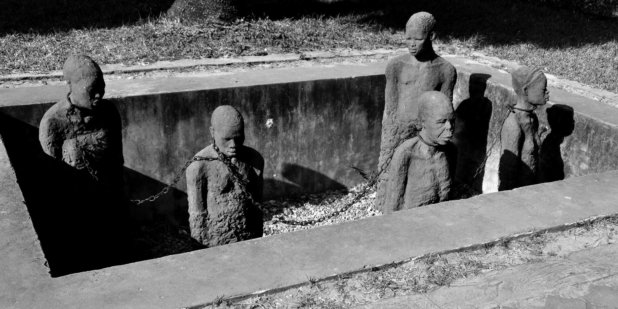- About
- Topics
- Picks
- Audio
- Story
- In-Depth
- Opinion
- News
- Donate
- Signup for our newsletterOur Editors' Best Picks.Send
Read, Debate: Engage.
In November 2017, the world woke up to the harrowing images of young Africans trapped in slave markets in Libya caged in deplorable conditions and being sold in live auctions for as little as $400 in what elicited memories only confined in history books about the atrocities the forefathers of the continent were subjected to in the wake of the decades-long slave trade.
But while that incident sparked international condemnation and furore, it lifted the veil on the numerous forms of slavery that continue target vulnerable Africans, from slavery, child labour, sex and human trafficking. It has also put into focus the role of the African Union, the umbrella body of the African countries and whether it is doing enough to end modern day servitude.
Despite numerous gains made in reversing modern day slavery, Africa continues to be the epicenter of the trade with actors riding on the vulnerability and desperation of those looking for better days.
Data indicates that there are an approximated 9.2 million Africans trapped in slavery in a business estimated to generate up to $13 billion in profits each year. Global estimates of child labour show that Africa has the largest number of child labourers standing at 72.1 million, approximately 20 percent of all children of Africa. While countries have stepped up their efforts to tackle the menace, the numbers keep rising. Available statistics for example show that child labour in Sub Saharan Africa went up to 22.4 percent in 2016 from 21.4 percent in 2012. This, even as the rest of the world recorded considerable progress in tackling it.
Critics argue that disjointed policies, lack of a clear voice and weak institutions at the African Union are to blame for mutating modern day slavery. “African Union should and must be at the forefront of championing and mobilizing member states to institute strict preventive measures to arrest factors that contribute to fanning slavery. But as things stand the union is only reactive and respond whenever an instance happens or the damage is already done,” said Hamilton Kweyu from the Governance and Public Policy department of The Technical University of Kenya.
Hamilton further adds that lack of commitment by member states to African Union’s vision and competing needs were further complicating implementation of proactive strategies to counter modern slavery.
African Union has in numerous occasions been vocal and active in responding to emerging slavery issues. In its blueprint Agenda 2063 , it has stipulated the interventions it seeks to implement to foster ‘an integrated continent; politically united and based on the ideals of PanAfricanism and the vision of Africa’s Renaissance.’
In the wake of the 2017 Libya slave trade, the AU Commission chairman Moussa Faki Mahamat was actively involved in putting pressure on regional and international bodies to hasten the freeing of trapped migrants, the closure of detention centers and dismantling of cartels behind the trade in what was considered a success.
The African Union came up with a three point emergency plan that is crediting with taming the slave trade. The immediate intervention involved formation of a joint AU and EU countries police force that would crack down on the cartels and financiers of the trade while bringing them to book. While the cases are ongoing, the exercise has been hailed as key in halting human rights violations in the North African country.
The second plan involved rescuing and repatriating migrants from the detention centers in Libya. In an agreement that has been hailed as landmark, the African Union entered into a deal with Rwanda which agreed to provide temporary refuge to the rescued migrants and the United Nations High Commissioner for Refugees, UNHCR. Under the arrangement, which is still ongoing, the African Union provides assistance with evacuations, mobilizing resources and providing strategic political support and coordination. More than 100 refugees have benefitted from this initiative.
The overall anti-slavery plan was the establishment of an African Union commission of inquiry into the causes of migration from Africa to Europe. This has inspired key interventions like encouraging the youth below 25 percent who take the dangerous journey to Europe to stay at home by introducing enterprises and businesses for them.
In 2018, the African Union in an unprecedented move made its voice heard in Mauritania, one of the last countries to abolish slavery and criminalize it in 2007, when the government failed to institute action against prevalent slavery. It particularly took issue with a case where a Mauritanian court sentenced a slave master who had kept two boys as slaves since birth for two years and a fine of £2,700 in what elicited global public outcry.
The boys appealed the ruling at the African Union Committee of Experts on the Rights and Welfare of the Child (ACERWC). In a first of its kind ruling for the continental body, it observed that the Mauritanian government had not done enough to stem the culture of hereditary slavery which was endemic in the country and was not committed to protect children from slavery and child labour. It directed that the government should financially compensate the two children for failing them.
While the jury is still out on whether the African Union has done enough to protect its people, the emerging trends in modern day slavery continue to pose new challenges to the union in the war on servitude. “The AU needs new and innovative approaches to tackle modern day slavery. The trade is becoming sophisticated and daring and in order to protect its people, the commission must equally embrace new tact and strategy,” said Hamilton.
